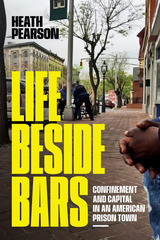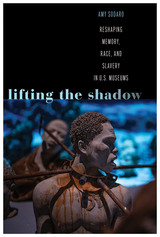110 scholarly books by National University of Singapore Press and 7
start with L
110 scholarly books by National University of Singapore Press and 7
110 scholarly books by National University of Singapore Press
7 start with L start with L
7 start with L start with L
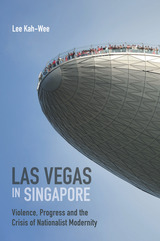
Las Vegas in Singapore
Violence, Progress and the Crisis of Nationalist Modernity
Lee Kah-Wee
National University of Singapore Press, 2018
Las Vegas in Singapore looks at the collision of the histories of Singapore and Las Vegas in the form of Marina Bay Sands, one of Singapore’s two integrated resorts.
The first history begins in colonial Singapore in the 1880s, when British administrators revised gambling laws in response to the political threat posed by Chinese-run gambling syndicates. Following the tracks of these punitive laws and practices, the book moves into the 1960s when the newly independent city-state created a national lottery while criminalizing both organized and petty gambling in the name of nation-building. The second history shifts the focus to corporate Las Vegas in the 1950s when digital technology and corporate management practices found each other on the casino floor. Tracing the emergence of the specialist casino designer, the book reveals how casino development evolved into a highly rationalized spatial template designed to maximize profits. Today an iconic landmark of Singapore, Marina Bay Sands is also an artifact of these two histories, an attempt by Singapore to normalize what was once criminalized in its nationalist history.
Lee Kah-Wee argues that the historical project of the control of vice is also about the control of space and capital. The result is an uneven landscape where the legal and moral status of gambling is contingent on where it is located. As the current wave of casino expansion spreads across Asia, he warns that these developments should not be seen as liberalization but instead as a continuation of the project of concentrating power by modern states and corporations.
The first history begins in colonial Singapore in the 1880s, when British administrators revised gambling laws in response to the political threat posed by Chinese-run gambling syndicates. Following the tracks of these punitive laws and practices, the book moves into the 1960s when the newly independent city-state created a national lottery while criminalizing both organized and petty gambling in the name of nation-building. The second history shifts the focus to corporate Las Vegas in the 1950s when digital technology and corporate management practices found each other on the casino floor. Tracing the emergence of the specialist casino designer, the book reveals how casino development evolved into a highly rationalized spatial template designed to maximize profits. Today an iconic landmark of Singapore, Marina Bay Sands is also an artifact of these two histories, an attempt by Singapore to normalize what was once criminalized in its nationalist history.
Lee Kah-Wee argues that the historical project of the control of vice is also about the control of space and capital. The result is an uneven landscape where the legal and moral status of gambling is contingent on where it is located. As the current wave of casino expansion spreads across Asia, he warns that these developments should not be seen as liberalization but instead as a continuation of the project of concentrating power by modern states and corporations.
[more]
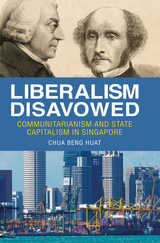
Liberalism Disavowed
Communitarianism and State Capitalism in Singapore
Beng Huat Chua
National University of Singapore Press, 2018
In Liberalism Disavowed, Chua Beng Huat examines the rejection of Western-style liberalism in Singapore and the way the People's Action Party has forged an independent non-Western ideology. This book explains the evolution of this communitarian ideology,
[more]

Life Is Not Complete Without Shopping
Consumption Culture in Singapore
Beng Huat Chua
National University of Singapore Press, 2013
One of the cliches that Singaporeans hold most dear is that their lives are a pursuit of the five c's: cash, cars, condominiums, credit cards, and club memberships. Over the last thirty years, Singaporeans have become accustomed to ever-increasing levels
[more]
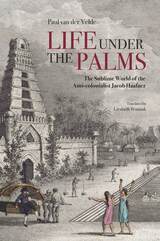
Life Under the Palms
The Sublime World of the Anti-colonialist Jacob Haafner
Paul van der Velde
National University of Singapore Press, 2019
Jacob Gotfried Haafner (1754–1809) was one of the most popular European travel writers of the early nineteenth century, writing in the Romantic mode. A Dutch citizen, Haafner spent more than twenty years of his early life living outside of Europe, in India, Ceylon, Mauritius, Java, and South Africa. Books like his popular Travels in a Palanquin were translated into the major European languages, and his essays against the work of Christian missionaries in Asia stirred up great controversy. Haafner worked to spread understanding of the cultures he’d come to know in his journeys, promoting European understanding of Indian literature, myth, and religion, translating the Ramayana into Dutch.
With the help of generous excerpts from Haafner's own writings, including material newly translated into English, Paul van der Velde tells an affecting story of a young man who made a world for himself along the Coromandel Coast, in Ceylon and Calcutta, but who returned to Europe to live the last years of his life in Amsterdam, suffering an acute nostalgia for Asia. This will be compelling reading for anyone interested in European response to the cultures of Asia.
With the help of generous excerpts from Haafner's own writings, including material newly translated into English, Paul van der Velde tells an affecting story of a young man who made a world for himself along the Coromandel Coast, in Ceylon and Calcutta, but who returned to Europe to live the last years of his life in Amsterdam, suffering an acute nostalgia for Asia. This will be compelling reading for anyone interested in European response to the cultures of Asia.
[more]

the lives & times of hrh
Herman Hochstadt
National University of Singapore Press, 2020
Herman Hochstadt, or hrh, as he is better known, joined Singapore’s civil service in 1960, rising quickly to the position of principal secretary for Prime Minister Lee Kuan Yew, and later serving as Permanent Secretary in key ministries like Finance and Defense. hrh had an unusual ability to inspire those working for him, and his signature wit and charm are on display in this winning memoir, which deftly weaves together stories of his career and some of the key moments of Singapore’s development. He begins with his Eurasian family’s history in Singapore, including that of his grandfather, John Hochstadt, who founded the Singapore Casket Company. He continues through his childhood, detailing an education that was interrupted by the Japanese occupation, before moving on to his working life, which included influential positions throughout the public and private sectors. Full of warmth and humor, the lives and times of hrh traces a life dedicated to public service in Singapore, from its time as a crown colony through its evolution to the Republic of Singapore.
[more]
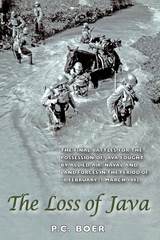
The Loss of Java
The Final Battles for the Possession of Java Fought by Allied Air, Naval and Land Forces in the Period of 18 February - 7 March 1942
P.C. Boer
National University of Singapore Press, 2011
The Loss of Java explains in detail the air, sea and land battles between the Allied and Japanese armed forces during the battle for Java that followed the evacuation of southern Sumatra in February 1942. Little has been written about the allied air campaign, or about why Dutch forces fought just one major land battle with the Japanese, the Battle of the Tjiater Pass, in the later stages of the struggle.
P.C. Boer considers whether the assessment of Major General Van Oyen that deploying the Allied air forces might prevent Japanese invasion of Java was realistic, and whether reliance on air power limited the capacity of land and naval forces to repel Japan's advances. The generally accepted idea is that the Allies were ineffective in their fight against the Japanese invaders but in fact the Japanese suffered serious losses. Boer's study shows that Dutch strategy grew out of a carefully-devised plan of defense, and that the battle for Java comprised not one (the Battle of the Java Sea) but four major engagements. However, Japanese commanders at various levels consciously took steps that exposed their forces to great risk but succeeded in putting the Allies under great pressure. In the end the Royal Netherlands East Indies Army (KNIL) and the allied forces capitulated on 8 March 1942.
This book is a translation of Het Verlies Van Java: Een kwestie van Air Power. De eindstrijd om Nederlands-Indie van de geallieerde lucht-, zee- en landstrijdkrschten in de periode van 18 februari t/m 7 maart 1942 (Amsterdam: Bataafsche Leeuw BV for the Koninklijke Militaire Academie, 2006).
P.C. Boer considers whether the assessment of Major General Van Oyen that deploying the Allied air forces might prevent Japanese invasion of Java was realistic, and whether reliance on air power limited the capacity of land and naval forces to repel Japan's advances. The generally accepted idea is that the Allies were ineffective in their fight against the Japanese invaders but in fact the Japanese suffered serious losses. Boer's study shows that Dutch strategy grew out of a carefully-devised plan of defense, and that the battle for Java comprised not one (the Battle of the Java Sea) but four major engagements. However, Japanese commanders at various levels consciously took steps that exposed their forces to great risk but succeeded in putting the Allies under great pressure. In the end the Royal Netherlands East Indies Army (KNIL) and the allied forces capitulated on 8 March 1942.
This book is a translation of Het Verlies Van Java: Een kwestie van Air Power. De eindstrijd om Nederlands-Indie van de geallieerde lucht-, zee- en landstrijdkrschten in de periode van 18 februari t/m 7 maart 1942 (Amsterdam: Bataafsche Leeuw BV for the Koninklijke Militaire Academie, 2006).
[more]

Love, Money and Obligation
Transnational Marriage in a Northeastern Thai Village
Patcharin Lapanun
National University of Singapore Press, 2019
Globalization has opened up a flow of economic and cultural exchanges. While we often think about these concepts in terms of trade policies or international treaties, they also play out in more intimate spheres, such as transnational marriages.
Northeast Thailand has seen an increase in marriages between Thai women and farang (Western) men. Often the women are less well off and from rural areas in the country, while the men largely come from the United States and Europe and settle permanently in Thailand. These unions have created a new social class, with distinctive consumption patterns and lifestyles. And they are challenging gender relations and local perceptions of sexuality, marriage, and family.
In Love, Money and Obligation, Patcharin Lapanun offers an exploration of these marriages and their larger effect on Thai communities. Her interviews with women and men engaging in these transnational relationships highlight the complexities of the associations, as they are shaped by love, money, and gender obligations on the one hand and the dynamics of socio-cultural and historical contexts on the other. Her in-depth and even-handed examination highlights the importance of women’s agency and the strength and creativity of people seeking to forge meaningful lives in the processes of social transition and in the face of local and global encounters.
Northeast Thailand has seen an increase in marriages between Thai women and farang (Western) men. Often the women are less well off and from rural areas in the country, while the men largely come from the United States and Europe and settle permanently in Thailand. These unions have created a new social class, with distinctive consumption patterns and lifestyles. And they are challenging gender relations and local perceptions of sexuality, marriage, and family.
In Love, Money and Obligation, Patcharin Lapanun offers an exploration of these marriages and their larger effect on Thai communities. Her interviews with women and men engaging in these transnational relationships highlight the complexities of the associations, as they are shaped by love, money, and gender obligations on the one hand and the dynamics of socio-cultural and historical contexts on the other. Her in-depth and even-handed examination highlights the importance of women’s agency and the strength and creativity of people seeking to forge meaningful lives in the processes of social transition and in the face of local and global encounters.
[more]
READERS
Browse our collection.
PUBLISHERS
See BiblioVault's publisher services.
STUDENT SERVICES
Files for college accessibility offices.
UChicago Accessibility Resources
home | accessibility | search | about | contact us
BiblioVault ® 2001 - 2024
The University of Chicago Press



